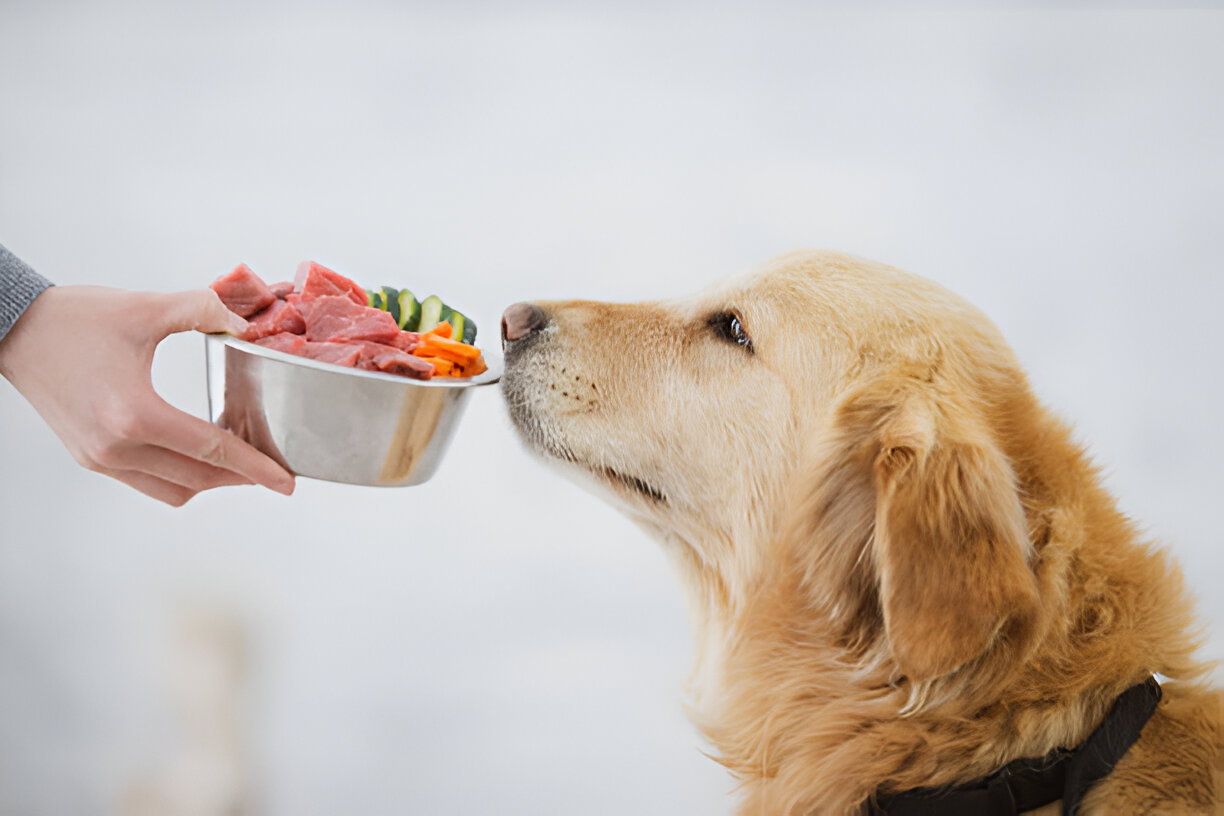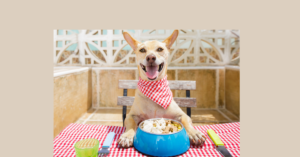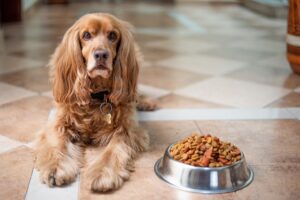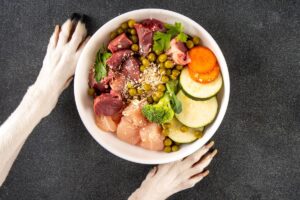As dog owners, we often find ourselves tempted to share our favorite snacks with our furry companions. After all, those pleading puppy eyes can be hard to resist! However, not all human foods are safe for dogs, and some can even be downright dangerous. Knowing which foods are safe and which are harmful is vital to ensuring your dog’s health and happiness.
In this article, we’ll explore the human foods that are safe for dogs, their nutritional benefits, and the precautions you should take when introducing new foods to your pet. From fruits and vegetables to proteins and grains, we’ll dive into the specifics of what your dog can eat and why it matters. Along the way, we’ll also touch on common misconceptions and provide practical tips for feeding your canine friend responsibly.
Table of Contents
Fruits Dogs Can Safely Eat
Many fruits can be a healthy and delicious addition to your dog’s diet. They are rich in vitamins, antioxidants, and fiber, all of which contribute to overall health. However, not all fruits are safe, so it’s important to know which ones are beneficial and which ones to avoid.
Safe Fruits for Dogs
- Apples
Apples are an excellent source of vitamins A and C, as well as dietary fiber. They can aid in digestion and promote dental health when given in small, bite-sized pieces. Be sure to remove the seeds and core, as apple seeds contain cyanogenic glycosides, which can be toxic in large amounts. - Blueberries
Packed with antioxidants, blueberries can help combat oxidative stress and support brain health. These tiny fruits are a low-calorie treat that’s perfect for training sessions or as an occasional snack. - Bananas
Bananas are rich in potassium, vitamin B6, and vitamin C. They are great for energy but should be fed in moderation due to their high sugar content. - Watermelon
Watermelon is a hydrating and refreshing treat, especially during hot weather. It contains vitamins A, B6, and C and is low in calories. Remove the seeds and rind before offering it to your dog. - Strawberries
Strawberries are a sweet, low-calorie snack that provides vitamin C and fiber. They also contain an enzyme that can help whiten your dog’s teeth!
Fruits to Avoid
- Grapes and Raisins: These can cause acute kidney failure in dogs, even in small amounts.
- Citrus Fruits: Oranges, lemons, and limes are highly acidic and can upset your dog’s stomach.
- Cherries: The pits contain cyanide, and the fruit itself can pose a choking hazard.
When introducing fruits to your dog’s diet, always start with small quantities to ensure they don’t have an adverse reaction. Wash fruits thoroughly and cut them into manageable pieces to prevent choking.
Vegetables Your Dog Can Enjoy
Vegetables can be a nutritious supplement to your dog’s regular diet, providing essential vitamins, minerals, and fiber. Unlike fruits, most vegetables are lower in sugar, making them a healthier option for regular consumption.
Dog-Friendly Vegetables
- Carrots
Carrots are a crunchy, low-calorie snack that is great for your dog’s teeth and eyesight. Rich in beta-carotene, carrots support vision health and provide a satisfying chew. - Green Beans
Green beans are packed with fiber and vitamins A, C, and K. They can be served cooked or raw, but avoid canned green beans with added salt. - Sweet Potatoes
Sweet potatoes are a nutrient-dense source of fiber, vitamin A, and potassium. Cooked sweet potatoes are a safer option than raw ones, which can be difficult for dogs to digest. - Pumpkin
Pumpkin is excellent for digestion, helping to regulate bowel movements. Plain, cooked pumpkin (not pumpkin pie filling) is a safe and nutritious treat for dogs. - Cucumber
Cucumbers are low in calories and high in hydration, making them a great snack for overweight dogs or those needing to cool off in warm weather.
Vegetables to Avoid
- Onions and Garlic: Both can cause anemia in dogs by damaging red blood cells.
- Mushrooms: While some store-bought mushrooms are safe, many wild mushrooms are toxic. It’s best to avoid mushrooms altogether.
- Tomatoes: The green parts of tomatoes, including the stems and leaves, contain solanine, which is toxic to dogs.
When preparing vegetables for your dog, steaming or boiling is often the safest cooking method. Avoid seasoning, oils, and butter, which can upset your dog’s stomach.
Proteins Dogs Can Safely Eat
Proteins are a crucial part of a dog’s diet, supporting muscle growth, energy levels, and overall health. While commercial dog food often contains protein, adding certain human foods can be a tasty and nutritious supplement.
Safe Protein Sources
- Chicken
Cooked, plain chicken (without bones) is a lean protein that can be easily added to your dog’s meals or served as a treat. - Turkey
Similar to chicken, turkey is a great source of lean protein. Remove the skin and bones before serving to prevent choking or gastrointestinal issues. - Eggs
Eggs are an excellent source of protein, as well as vitamins and minerals. Serve them cooked to reduce the risk of salmonella. Scrambled or boiled eggs without seasoning are ideal. - Fish
Salmon, whitefish, and cod are rich in omega-3 fatty acids, which promote healthy skin and a shiny coat. Always cook fish thoroughly and remove any bones. Avoid feeding raw or smoked fish. - Peanut Butter
Peanut butter (in moderation) is a tasty source of protein and healthy fats. Ensure it’s free from xylitol, an artificial sweetener that is highly toxic to dogs.
Proteins to Avoid
- Pork with Bones: Bones can splinter and cause internal injuries.
- Raw Meat: While some advocate for raw diets, raw meat can carry bacteria like salmonella and E. coli.
- Fatty Meats: High-fat proteins like bacon can lead to pancreatitis.
When incorporating proteins into your dog’s diet, balance is key. Too much protein can lead to weight gain, so portion control is essential.
FAQ: What Human Foods are Safe for Dogs?
- Can dogs eat peanut butter?
Yes, plain, unsalted peanut butter is safe in moderation, but avoid those with xylitol, which is toxic to dogs. - Are carrots safe for dogs?
Absolutely! Carrots are a healthy, low-calorie snack that’s great for your dog’s teeth and overall health. - Can dogs have cooked eggs?
Yes, cooked eggs are a good source of protein and essential nutrients for dogs. Avoid seasoning or raw eggs. - Is plain rice safe for dogs?
Yes, plain white or brown rice is gentle on a dog’s stomach and often recommended for upset tummies. - Can dogs eat apples?
Yes, apples are safe and nutritious, but remove the core and seeds as they contain small amounts of cyanide. - Are bananas good for dogs?
Yes, bananas are a healthy treat in moderation due to their high sugar content. - Can dogs have plain yogurt?
Yes, plain, unsweetened yogurt (especially with live probiotics) can benefit your dog’s digestion. Avoid those with added sugars or artificial sweeteners. - Is pumpkin safe for dogs?
Yes, plain canned pumpkin (not pie filling) is great for digestion and helps with diarrhea or constipation. - Can dogs eat cheese?
Yes, in small amounts, cheese can be a tasty treat for dogs, but avoid it if your dog is lactose intolerant. - Are blueberries safe for dogs?
Yes, blueberries are a healthy, antioxidant-rich treat that dogs can enjoy in moderation.
Conclusion
Understanding what human foods are safe for dogs is an essential part of being a responsible pet owner. While sharing certain foods with your furry friend can provide nutritional benefits and strengthen your bond, it’s crucial to do so with caution and knowledge.
Fruits like apples and blueberries, vegetables like carrots and green beans, and proteins such as chicken and eggs can all be healthy additions to your dog’s diet when prepared properly and given in moderation.
However, not all human foods are created equal—some, like grapes, chocolate, onions, and xylitol-sweetened products, can pose serious health risks. By familiarizing yourself with these dos and don’ts, you can avoid harmful mistakes and keep your dog safe, healthy, and happy.






Pingback: How to Puppy-Proof Your Home Like a Pro
Pingback: 10 Ways to Keep Your Dog Healthy and Happy Year-Round